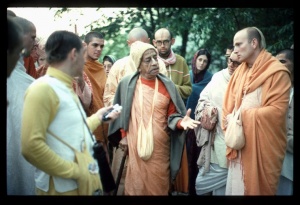SB 1.4.11: Difference between revisions
m (1 revision(s)) |
(Vanibot #0020: VersionCompareLinker - added a link to the Version Compare feature) |
||
| Line 1: | Line 1: | ||
{{info | {{info | ||
|speaker= | |speaker=Śaunaka Ṛṣi | ||
|listener= | |listener=Sūta Gosvāmī and the Sages | ||
}} | }} | ||
[[Category:Srimad-Bhagavatam - Canto 01 Chapter 04]] | |||
[[Category:Bhagavatam Verses Spoken by Saunaka Rsi - Vanisource|010411]] | |||
<div style="float:left">'''[[Srimad-Bhagavatam]] - [[SB 1|First Canto]] - [[SB 1.4: The Appearance of Sri Narada|Chapter 4: The Appearance of Śrī Nārada]]'''</div> | |||
<div style="float:right">[[File:Go-previous.png|link=SB 1.4.10]] '''[[SB 1.4.10]] - [[SB 1.4.12]]''' [[File:Go-next.png|link=SB 1.4.12]]</div> | |||
{{CompareVersions|SB|1.4.11|SB 1962|SB 1972-77}} | |||
{{RandomImage}} | |||
==== TEXT 11 ==== | ==== TEXT 11 ==== | ||
<div | <div class="verse"> | ||
namanti yat-pāda-niketam ātmanaḥ | :namanti yat-pāda-niketam ātmanaḥ | ||
śivāya hānīya dhanāni śatravaḥ | :śivāya hānīya dhanāni śatravaḥ | ||
kathaṁ sa vīraḥ śriyam aṅga dustyajāṁ | :kathaṁ sa vīraḥ śriyam aṅga dustyajāṁ | ||
yuvaiṣatotsraṣṭum aho sahāsubhiḥ | :yuvaiṣatotsraṣṭum aho sahāsubhiḥ | ||
</div> | </div> | ||
| Line 17: | Line 23: | ||
==== SYNONYMS ==== | ==== SYNONYMS ==== | ||
<div | <div class="synonyms"> | ||
''namanti''—bow down; ''yat-pāda''—whose feet; ''niketam''—under; ''ātmanaḥ''—own; ''śivāya''—welfare; ''hānīya''—used to bring about; ''dhanāni''—wealth; ''śatravaḥ''—enemies; ''katham''—for what reason; ''saḥ''—he; ''vīraḥ''—the chivalrous; ''śriyam''—opulences; ''aṅga''—O Sūta Gosvāmī; ''dustyajām''—insuperable; ''yuvā''—in full youth; ''aiṣata''—desired; ''utsraṣṭum''—to give up; ''aho''—exclamation; ''saha''—with; ''asubhiḥ''—life. | |||
</div> | </div> | ||
| Line 24: | Line 30: | ||
==== TRANSLATION ==== | ==== TRANSLATION ==== | ||
<div | <div class="translation"> | ||
He was such a great emperor that all his enemies would come and bow down at his feet and surrender all their wealth for their own benefit. He was full of youth and strength, and he possessed insuperable kingly opulences. Why did he want to give up everything, including his life? | He was such a great emperor that all his enemies would come and bow down at his feet and surrender all their wealth for their own benefit. He was full of youth and strength, and he possessed insuperable kingly opulences. Why did he want to give up everything, including his life? | ||
</div> | </div> | ||
| Line 31: | Line 37: | ||
==== PURPORT ==== | ==== PURPORT ==== | ||
<div | <div class="purport"> | ||
There was nothing undesirable in his life. He was quite a young man and could enjoy life with power and opulence. So there was no question of retiring from active life. There was no difficulty in collecting the state taxes because he was so powerful and chivalrous that even his enemies would come to him and bow down at his feet and surrender all wealth for their own benefit. Mahārāja Parīkṣit was a pious king. He conquered his enemies, and therefore the kingdom was full of prosperity. There was enough milk, grains and metals, and all the rivers and mountains were full of potency. So materially everything was satisfactory. Therefore, there was no question of untimely giving up his kingdom and life. The sages were eager to hear about all this. | There was nothing undesirable in his life. He was quite a young man and could enjoy life with power and opulence. So there was no question of retiring from active life. There was no difficulty in collecting the state taxes because he was so powerful and chivalrous that even his enemies would come to him and bow down at his feet and surrender all wealth for their own benefit. Mahārāja Parīkṣit was a pious king. He conquered his enemies, and therefore the kingdom was full of prosperity. There was enough milk, grains and metals, and all the rivers and mountains were full of potency. So materially everything was satisfactory. Therefore, there was no question of untimely giving up his kingdom and life. The sages were eager to hear about all this. | ||
</div> | </div> | ||
__NOTOC__ | |||
<div style="float:right; clear:both;">[[File:Go-previous.png|link=SB 1.4.10]] '''[[SB 1.4.10]] - [[SB 1.4.12]]''' [[File:Go-next.png|link=SB 1.4.12]]</div> | |||
__NOTOC__ | |||
__NOEDITSECTION__ | |||
Revision as of 11:06, 25 May 2020

A.C. Bhaktivedanta Swami Prabhupada
TEXT 11
- namanti yat-pāda-niketam ātmanaḥ
- śivāya hānīya dhanāni śatravaḥ
- kathaṁ sa vīraḥ śriyam aṅga dustyajāṁ
- yuvaiṣatotsraṣṭum aho sahāsubhiḥ
SYNONYMS
namanti—bow down; yat-pāda—whose feet; niketam—under; ātmanaḥ—own; śivāya—welfare; hānīya—used to bring about; dhanāni—wealth; śatravaḥ—enemies; katham—for what reason; saḥ—he; vīraḥ—the chivalrous; śriyam—opulences; aṅga—O Sūta Gosvāmī; dustyajām—insuperable; yuvā—in full youth; aiṣata—desired; utsraṣṭum—to give up; aho—exclamation; saha—with; asubhiḥ—life.
TRANSLATION
He was such a great emperor that all his enemies would come and bow down at his feet and surrender all their wealth for their own benefit. He was full of youth and strength, and he possessed insuperable kingly opulences. Why did he want to give up everything, including his life?
PURPORT
There was nothing undesirable in his life. He was quite a young man and could enjoy life with power and opulence. So there was no question of retiring from active life. There was no difficulty in collecting the state taxes because he was so powerful and chivalrous that even his enemies would come to him and bow down at his feet and surrender all wealth for their own benefit. Mahārāja Parīkṣit was a pious king. He conquered his enemies, and therefore the kingdom was full of prosperity. There was enough milk, grains and metals, and all the rivers and mountains were full of potency. So materially everything was satisfactory. Therefore, there was no question of untimely giving up his kingdom and life. The sages were eager to hear about all this.